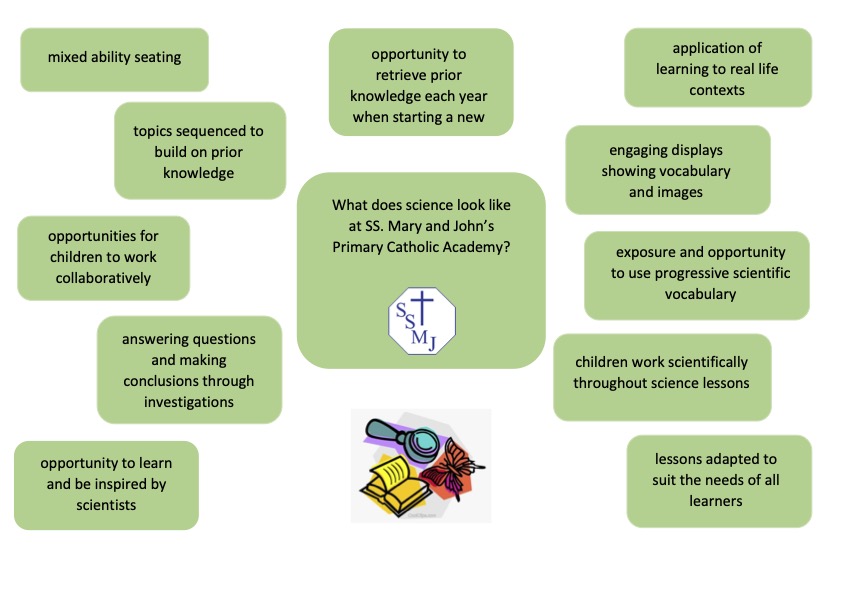
Intent
Science provides children with lifelong learning about the world around them. We recognise the importance of science in every aspect of daily life and seek to equip pupils with the knowledge and skills to support the children to be inquisitive and independent. The planned curriculum supports the children to acquire and develop the key knowledge that has been identified within each unit and across each year group. We will ensure that the Working Scientifically skills are built-on and developed throughout children’s time at the school so that they can apply their knowledge of science when using equipment, building arguments and explaining concepts confidently. We will encourage them to continue asking questions and to be curious about the world around them.
Implementation
Children In the Early Years Foundation Stage (EYFS) focus on the world around them. They experience the seasonal changes through their senses and give it purpose by discussing how it affects them in their life, such as the clothes they wear. Similarly, they explore living things around them whilst understanding respect for living things. Children are discreetly taught the value of caring for our common home and being responsible for taking care of the world we live in and all of God’s creations.
Science lessons are taught in topics following the direction of the National Curriculum. They are sequenced to: ensure children are exposed to content for the right length of time; in the right order reflecting the time of year where necessary; and carefully mapped out alongside other subjects where prior knowledge is beneficial before meeting the topic in Science. Like building blocks, children build upon their Science knowledge each year through each topic. Children experience the broad range and balance of Sciences: biology, chemistry and physics.
In key stage 1 and 2, children experience weekly Science lessons. These include investigations, learning walks and discrete knowledge-based lessons. Throughout these lessons, children are working scientifically at the earlier stages in Early Years and more complex stages in upper key stage 2.
In key stage 1, children learn through experience. They engage in outdoor learning opportunities where possible, to see natural phenomena. Children are encouraged to work scientifically (observing changes over a period of time, noticing patterns, grouping and classifying things, carrying out simple comparative tests, and finding things out using secondary sources of information) to find the answer to questions. Children should spell scientific vocabulary consistent with their word reading and spelling knowledge at key stage 1.
In lower key stage 2, the National Curriculum requires children to broaden their scientific view of the world around them. This can be conducted through different strands of working scientifically: exploring relationships, testing and developing ideas about everyday wonders and asking questions about their observations. In lower key stage 2, children will begin to make decisions about which strand of scientific enquiry is likely to be the most efficient way to answer their questions. They will be able to reach simple conclusions using scientific language to talk and write about what they have found out. Children should become more confident and familiar when reading and spelling scientific vocabulary consistent with their increasing word reading and spelling knowledge.
In upper key stage 2, children are exposed to a wide range of scientific ideas. Children will encounter more abstract ideas about the world and begin to recognise how these ideas help them to understand how the world works. However, they will also be able to recognise that scientific ideas change and develop over time. When working scientifically in upper key stage 2, children have more autonomy over choosing the most appropriate methods and scientific enquiry to answer a question. This might include: observing changes over different periods of time, noticing patterns, grouping and classifying things, carrying out comparative and fair tests and finding things out using a wide range of secondary sources of information. Pupils should then draw conclusions based on their data and observations, use evidence to justify their ideas and use their scientific knowledge to explain their findings. Children should read, spell and pronounce scientific vocabulary correctly.
Impact
Our approach at SSMJ results in a fun, engaging, high-quality science education that provides children with the foundations and knowledge for understanding the world. Children acquire knowledge to help them know more and remember more. Children retain prior-learning and explicitly make connections between what they have previously learned and what they are currently learning.Children are learning at the age-related standard for their year group. All children will have:
- A wider variety of skills linked to both scientific knowledge and understanding, and scientific enquiry/investigative skills .
- A richer vocabulary which will enable them to articulate their understanding of taught concepts .
- Confidence and a love of learning for all things science
- Secure foundation for in developing their learning into secondary school and beyond.
If you would like more information about the curriculum please contact school where we will be happy to help.

